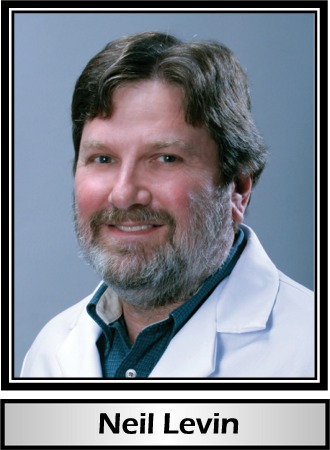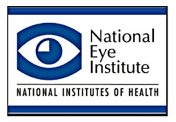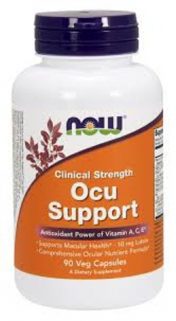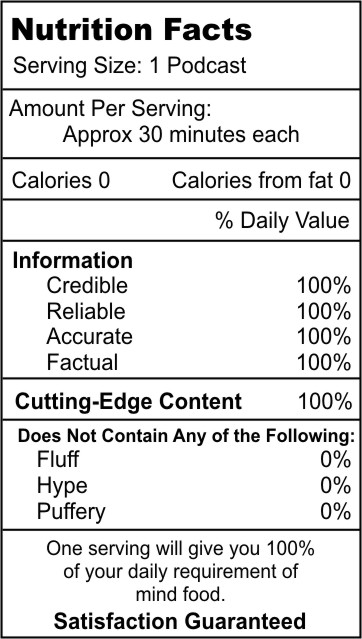Podcast: Play in new window | Download (Duration: 42:16 — 77.7MB)
Protecting your eyes and vision.
 When I was younger, I remember that the common wisdom was that eating carrots was good for your eyes. That was about it. The opinion of the medical community was that nutrition, diet and/or supplementation was not beneficial for eye health and was in fact a waste of money. Of course, this was no different that the medical wisdom of 45 years ago which said just eat the standard American diet and you would be just fine. We know now that that advice was ignorant and ill-informed. Science is finally revealing the benefits of nutrition throughout the human system including the eyes. Doesn’t just make sense that tissues that are well nourished will do better that those that are not? People will do better when they are well nourished.
When I was younger, I remember that the common wisdom was that eating carrots was good for your eyes. That was about it. The opinion of the medical community was that nutrition, diet and/or supplementation was not beneficial for eye health and was in fact a waste of money. Of course, this was no different that the medical wisdom of 45 years ago which said just eat the standard American diet and you would be just fine. We know now that that advice was ignorant and ill-informed. Science is finally revealing the benefits of nutrition throughout the human system including the eyes. Doesn’t just make sense that tissues that are well nourished will do better that those that are not? People will do better when they are well nourished.
When it comes to vision and eye health, people are very concerned, especially as we age. Fear of losing one’s sight is a common anxiety for many people, again especially seniors. This becomes critical when one is facing issues such as age-related macular degeneration (AMD). The question is “can nutrition (diet and/or supplementation) have a positive affect on AMD?” I need to reemphasize that nutrition does not treat or cure any eye disease including AMD. What food and supplements do is deliver nutrients to the body. It is the body that uses nutrients to maintain and normalize cellular and tissue function. Let the doctors treat your disease. You should focus on nourishing your body with the specific nutrients that have been shown to provide the benefits you seek. Drugs do not nourish the body and nutrients are not drugs. Please don’t confuse the two. You will have more success when you understand this distinction.
 There have been numerous scientific and clinical studies that have revealed the benefits of certain nutrients for eye health and specifically AMD and the history of some of these studies is revealing. The studies that more experts refer to is called AREDS and AREDS-2. (Age-Related Eye Disease Study). These two studies were sponsored by the National Eye Institute (NEI) of the National Institutes of Health (NIH). So these are serious studies. In a nutshell the studied revealed “Taking the formulation reduced the rate of advanced AMD in people at high risk by about 25 percent over a 6-year period.” You can read more here.
There have been numerous scientific and clinical studies that have revealed the benefits of certain nutrients for eye health and specifically AMD and the history of some of these studies is revealing. The studies that more experts refer to is called AREDS and AREDS-2. (Age-Related Eye Disease Study). These two studies were sponsored by the National Eye Institute (NEI) of the National Institutes of Health (NIH). So these are serious studies. In a nutshell the studied revealed “Taking the formulation reduced the rate of advanced AMD in people at high risk by about 25 percent over a 6-year period.” You can read more here.
Here is a quote from the American Optometric Association:
Adding powerful antioxidants to your diet can improve your eye health.
 There’s no substitute for the quality of life good vision offers. Adding certain nutrients to your daily diet—either through foods or supplements—can help preserve your vision. Researchers have linked eye-friendly nutrients, such as lutein and zeaxanthin, vitamin C, vitamin E and zinc, to reducing the risk of certain eye diseases.
There’s no substitute for the quality of life good vision offers. Adding certain nutrients to your daily diet—either through foods or supplements—can help preserve your vision. Researchers have linked eye-friendly nutrients, such as lutein and zeaxanthin, vitamin C, vitamin E and zinc, to reducing the risk of certain eye diseases.
- Lutein & Zeaxanthin – Lutein and zeaxanthin are important nutrients found in green leafy vegetables, as well as other foods, such as eggs. Many studies show that lutein and zeaxanthin reduce the risk of chronic eye diseases, including age-related macular degeneration and cataracts.
- Vitamin C – Vitamin C (ascorbic acid) is an antioxidant found in fruits and vegetables. Scientific evidence suggests vitamin C lowers the risk of developing cataracts. Also, when taken in combination with other essential nutrients, it can slow the progression of age-related macular degeneration and visual acuity loss.
- Vitamin E – Vitamin E is a powerful antioxidant found in nuts, fortified cereals and sweet potatoes. Research indicates it protects cells in the eyes from unstable molecules called free radicals, which break down healthy tissue.
- Essential Fatty Acids – Fats are a necessary part of the human diet. They maintain the integrity of the nervous system, fuel cells and boost the immune system. Research shows omega-3 fatty acids are important for proper visual development and retinal function.
- Zinc – Zinc is an essential trace mineral or “helper molecule.” It plays a vital role in bringing vitamin A from the liver to the retina in order to produce melanin, a protective pigment in the eyes. Zinc is highly concentrated in the eye, mostly in the retina and choroid, the vascular tissue layer lying under the retina. End quote
 In this interview, Neil Levin discusses eye health and the science of nutrition and AMD. We will also discuss the NOW product called Ocu Support (formally Eye Support). Ocu Support has been formulated to offer comprehensive nutritional protection for the eyes. Each serving has 10 mg of available Lutein, a critical pigment of the macula, lens, and other ocular tissues. Lutein is a free-radical scavenger related to beta-carotene that defends the eye from the ravages of sunlight. NOW has also included Green Tea Extract, Alpha Lipoic Acid and Grape Seed Extract in this formula to maximize its free radical scavenging potential.
In this interview, Neil Levin discusses eye health and the science of nutrition and AMD. We will also discuss the NOW product called Ocu Support (formally Eye Support). Ocu Support has been formulated to offer comprehensive nutritional protection for the eyes. Each serving has 10 mg of available Lutein, a critical pigment of the macula, lens, and other ocular tissues. Lutein is a free-radical scavenger related to beta-carotene that defends the eye from the ravages of sunlight. NOW has also included Green Tea Extract, Alpha Lipoic Acid and Grape Seed Extract in this formula to maximize its free radical scavenging potential.
About Neil Levin
Neil E. Levin, CCN, DANLA is the Senior Education Manager and a product formulator for NOW® Foods. He is a board-certified clinical nutritionist with a diplomate in advanced nutritional laboratory assessment. The U.S. Natural Products Association (NPA) presented Neil its Industry Champion Award in 2008 for “people who have made notable individual contributions to the natural products industry above and beyond what is expected to achieve commercial success.”
Neil’s interviews and articles are published in magazines and newspapers. He has been featured in many radio interviews and television news reports. Neil blogs at www.honestnutrition.com; is on Facebook (Honest Nutrition) and Twitter (neilelevin).
About NOW Foods
Founded by Elwood Richard in 1968 on the belief that natural is better, NOW has grown from a small family operation into one of the most highly respected manufacturers in the natural products industry. Still a family-owned company today, NOW offers more than 1,400 dietary supplements, foods, sports nutrition and personal care products. NOW is committed to offering safe, affordable products of the highest quality, and is a highly regarded advocate in the natural products industry. Its state-of-the-art manufacturing facility in Bloomingdale, Ill., has been GMP (Good Manufacturing Practice)-certified since 2000 and its in-house laboratory capabilities are among the best in the industry. The company has over 1400 employees, and its products are sold in more than 60 countries. After nearly 50 years in the natural products industry, NOW remains committed to its original mission – to provide value in products and services that empower people to lead healthier lives.











{ 0 comments… add one now }